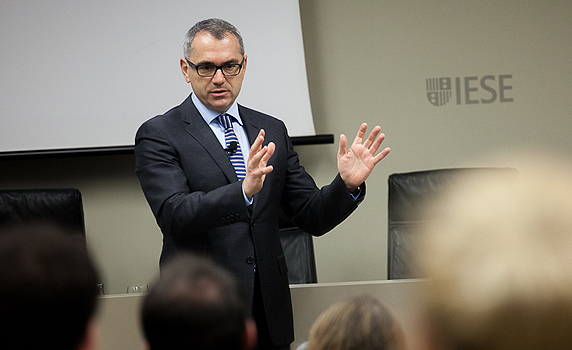
"The biggest risk is not to take any risks," Marc Puig, chairman and CEO of the family-run firm Puig, told a session in the MBA Global Leadership Series in Barcelona today titled "Key Success Factors in Building a Global Company."
After an introduction by Dean Jordi Canals, Puig, recounted something of the history of the company founded by his grandfather in 1914. Spain was isolated and impoverished for decades after the end of the Civil War and so Marc Puig’s father and uncle started marketing their own brands of perfume internationally. They then teamed up with Paco Rabanne in 1968 and this was true beginning of the firm’s internationalization.
Outside of Spain Puig doesn’t sell under its own brand but markets other luxury brands such as Carolina Herrera, Nina Ricci, Paco Rabanne, Jean Paul Gaultier, Prada and Valentino. When it acquires fashion houses, Puig said, it doesn’t interfere in the creative side of the business. "We try to sell not just products but experiences," he said. "We try to tell stories."
After a period of steady growth in the 1990s things began to flatten out at the start of this century. "We had to ask ourselves if there was something we could do better than others that would justify our existence," Puig said. "We are at our best at marketing fashion and fragrance. We had become distracted by doing too many things. We needed to focus on our strengths."
At Puig, he said, the emphasis is on passion, teamwork and treating people with respect. The company tries to hire people who engage with its value system and the focus on efficiency and excellence. Puig said he was particularly proud of the rise in market share, given that they are small player compared to their competitors that include giants such Procter & Gamble and l’Oréal. Market share is currently 8.1% and the goal is to reach 10%.
Asked if Puig would they sacrifice family ownership in order to raise capital he said there was no plan to do so but that nothing was ruled out. The idea has always been to build the business and pass it on to next generation, he said. "As long as we’re perceived as an innovative company people will be attracted to us."